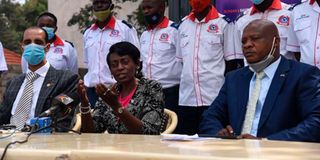Sell your agenda to demystify propaganda, aspirants urged

Former deputy secretary-general of the Commonwealth Dr Josephine Ojiambo (second left) at a media event last year. She has advised female aspirants to ignore negative politics in the campaign trail and sell their agenda.
What you need to know:
- Female political aspirants have been advised to remain focused on their agenda and avoid any negative politics.
- A 2016 paper on Gender Issues in Electoral Politics in Kenya established that during the 2013 General Election, women suffered deflective campaigns that denied them votes.
As women hit the campaign trail ahead of the 2022 General Election, they are bound to encounter a tough terrain, including propaganda to repel voters from electing them.
To save themselves, speakers during an October 19 Women in politics media engagement webinar, advised the aspirants to remain focused on their agenda and avoid any negative politics.
“Just tell the electorate that you have the technical skills or experience that you have come to use for social development,” said Dr Josephine Ojiambo, former deputy secretary-general of the Commonwealth during the virtual forum organised by Mechanisms to Promote the Advancement of Women.
A 2016 paper on Gender Issues in Electoral Politics in Kenya by Prof Wanjiku Kabira and Prof Patricia Mbote underlies the challenges women face in their quest to ascend to political leadership.
Deflective campaigns
It established that during the 2013 General Election, women suffered deflective campaigns that denied them votes.
“Some of my opponents kept reminding the electorate that the Kitutu constituents since independence (have) never been led by a woman, so let Rebecca contest for the Woman Representative seat and leave the National Assembly seat to male candidates,” Rebecca Otachi, who contested, is quoted in the paper.
Another contestant from West Pokot, Rhoda Rotino said: “Some male rivals confused the electorate (by arguing) that women could not vie for any other position apart from that of the woman representative. Men are highly rated in society and the propaganda was taken as gospel truth.”
However, to support women secure elective seats, some political parties employed affirmative action.
According to the Institute for War and Peace Reporting, Orange Democratic Movement, United Republican Party, United Democratic Forum Party and The National Alliance, then lowered nomination fees for women and provided some financial and organisational support to the more promising candidates during the campaigns.
Recently, disability rights advocates urged political parties to finance campaign activities for women with disabilities.
Women Challenged to Challenge director Jane Kihungi, said inadequate resources frustrate women with disabilities’ quest for elective seats. As such political parties ought to plug in and enable them to successfully compete.
“Women with disabilities have the right not just to vote but to also be elected,” she said during an October 15, Federation of Women Lawyers-Kenya webinar on Increasing Public Participation for Inclusive Elections in 2022 and Beyond.





